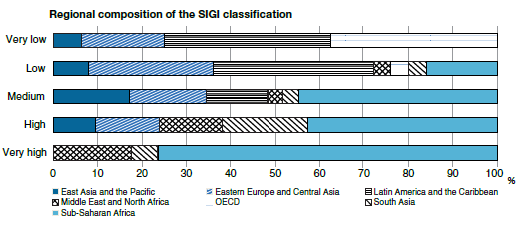Gender and development
2014 edition of the Social Institutions and Gender Index: tackling the root causes of gender inequality is possible and is key to counteracting the negative domino effects of inequality throughout a woman’s life, says the OECD Development Centre
Oslo, 27/11/2014 – Countries at different levels of development have made important strides in reducing gender discrimination through promising initiatives that tackle discriminatory social norms, the results of the Social Institutions and Gender Index (SIGI) 2014 show. However, gaps and challenges remain across key areas affecting women’s socio-economic and political rights as well as freedom from violence, both in developing and OECD countries.
"What is not counted does not count. This is why the OECD Development Centre strives to measure discriminatory social norms and institutions. It is everyone's responsibility to change those norms and make gender equality a reality", said Federico Bonaglia, Deputy Director (a.i) of the OECD Development Centre, today, at the launch of the 2014 edition of the SIGI at the Ministry of Foreign Affairs in Oslo, Norway.
According to the Index, discriminatory social institutions carry a strong penalty for the socioeconomic performance and development outcomes.
For the first time since its launch in 2009, the Gender and Institutions Database underpinning the SIGI includes OECD member countries into its analysis, bringing the coverage to 160 country profiles.
Out of this coverage, 108 countries have comprehensive data that allow for comparison according to their level of discrimination in social institutions. It classifies them into five groups, from very low levels of discrimination - these include countries with robust legal frameworks and measures that provide equal rights in most of the SIGI dimensions - to very high levels of discrimination, which includes countries with discriminatory legal frameworks and customary practices across most dimensions.

Some key results from the 2014 edition include:
- Among the 108 countries for which the overall SIGI is computed, Argentina, Belgium Mongolia and Trinidad and Tobago have the lowest levels of gender inequality related to social institutions; on the other end of the spectrum, gender inequality in social institutions is a major problem in Bangladesh, Egypt, Niger and Yemen.
- Unpaid domestic responsibilities are mainly performed by women, who spend three times more of their time on unpaid domestic work than men, ranging from 1.3 times in Denmark to 10 times in Pakistan
- Violence against women is a global pandemic, perpetuated by social norms. 35% of women believe that domestic violence is justified under certain conditions, ranging from 3% in Jamaica to 92% in Guinea. 30% of women have been victims of gender-based violence in their lifetime, ranging from 7% in Canada to almost 80% in Angola.
- Women continue to be denied land rights across 102 countries through discriminatory laws or customary practices. This has a direct negative impact on their decision-making authority within their family and their economic empowerment opportunities.
- Only one out of five members of national parliaments is female.
In the lead up to the post-2015 agenda and adoption of the Sustainable Development Goals, the SIGI’s data and profiles show why a stand-alone goal on gender equality that responds to the universal challenges faced by women world-wide is critical for ensuring inclusive, rights-based sustainable development.
For further information please contact: Bochra Kriout ( Tel: +33 1 45 24 82 96), at the OECD Development Centre.
More information on the SIGI:
- Full SIGI 2014 results: www.genderindex.org
- Synthesis report
- Access the country profiles
- Access the regional profiles
- OECD Development Centre’s work on gender issues
Note to the editors: About the SIGI
Launched for the first time in 2009, the SIGI is a unique cross-country measure of the drivers of gender gaps and inequalities. Discriminatory social institutions are defined as formal and informal laws, social norms and practices that restrict or exclude women, and consequently curtail their access to rights, justice and empowerment opportunities. Gender-based discrimination is measured across five dimensions: discriminatory family code, restricted physical integrity, son bias, restricted access to resources and assets, and restricted civil liberties. As a composite Index, the SIGI scores countries on 14 indicators from early marriage, fertility preferences, political voice to land rights and access to financial services.
This year, country rankings have been replaced with a new classification by levels of discrimination, allowing for a better understanding of the common characteristics, trends and insights that positively transform social institutions and lead to lower levels of discrimination.
Related Documents